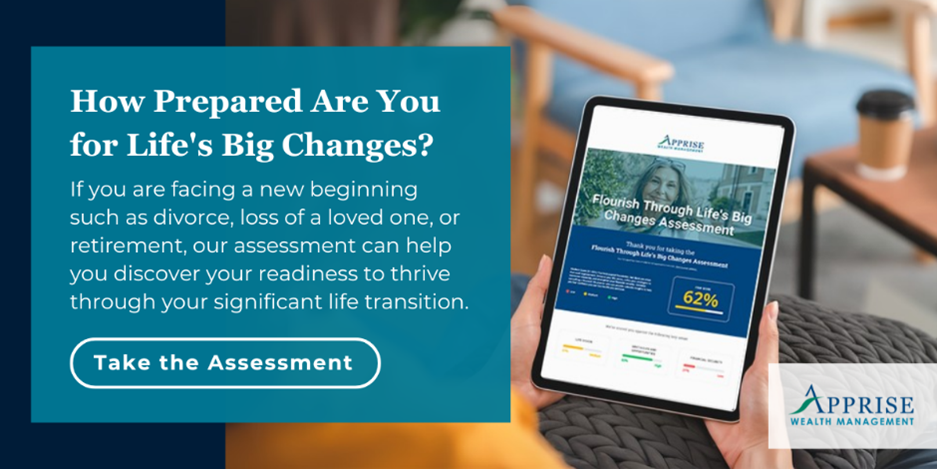Empower Yourself: Embrace Your Freedom to Choose Your Life
“When we are no longer able to change a situation, we are challenged to change ourselves.”
Viktor Frankl
We can’t always control the situation we’re in. But we always have the freedom to decide how we respond. The choices we make—and the mindset behind them—often determine how well we survive the situation and whether we go on to thrive.
If challenges in your family life, your career, or your finances leave you feeling powerless, try approaching the challenge from a new angle. This simple three-step process can help you regain your freedom to choose your life—how and why you live your life.
1. Consider your reaction.
Take a step back from the problem. Take a breath. Take a walk. Get your body moving and your blood flowing.
Creating some space can allow you to ask yourself, “Why am I reacting the way that I’m reacting? Could there be a more constructive or helpful way to view the situation? Am I letting past experiences influence my reaction for better? For worse?”
When we feel overwhelmed by a challenge, we often revert to established patterns of thought. Frequently, these default reactions are negative. If we’re arguing with our spouse, we might replay past arguments in the back of our heads. Financial difficulty might trigger memories of our parents struggling with money as we were growing up.
Identifying the negative experiences and perspectives that trigger our immediate reactions to challenges can help us develop more positive and empowering responses to them.
2. Consider your purpose.
Instead of allowing the situation to dictate your response, push back. Refocus your response so it more closely relates to the goal you are trying to accomplish.
For example, if your business partner backs out of the new company you’ve been planning to start, the loss of manpower and capital could leave you feeling defeated and powerless. But you might be focusing on the negatives that you can’t control.
So, what can you control?
If you’re fully committed to starting your new company, you can choose to focus on alternative funding sources instead. You can reach out to other friends, family, and colleagues about potential partnerships. You can choose to work on Plan B.
Another example is the investor who feels powerless as market volatility chips away at his nest egg for a quarter. No, you can’t control the natural disaster or political spat that’s giving the market fits right now. But you can elect to focus on your long-term purpose: a secure retirement for you and your family. And living your most fulfilling life. That positive thinking and big-picture perspective could prevent a costly knee-jerk reaction.
3. Consider your values—Reconnect with the Freedom to Choose Your Life
One of the best ways to drive negative thinking from our reactions is to focus on the things that matter the most to us. Reconnecting our decision-making to our values can lead to solutions that make life more fulfilling. Consider aligning your TEAM of resources—Time, Energy, Attention, and Money—with your values. Following this line of thinking can have a meaningful impact.
For many of us, work is a frequent source of stress or dissatisfaction. And while no one loves absolutely everything about their job all the time, it’s worth considering how your job affects your sense of freedom. Does your work support the life you want to live outside of your 40-hour work week? Are your skills and talents utilized in ways that make you feel like you’re making positive contributions? Does your employer have a mission bigger than profit that’s important to you?
If your answers are ‘no,’ ‘no,’ and ‘no,’ you can opt to keep dragging yourself out of bed every Monday, resigned to the uninspiring week ahead. Or you can follow your values towards a more empowering choice. Consider a career change. Learn a new skill that will bolster your resume or line you up for a better job at your current employer.
If switching careers is really out of the question right now, choose to appreciate the aspects of your job that you excel at due to your unique skill set. And when you’re not working, make time for the hobbies, interests, and experiences that allow you to fully engage with your core values. Who knows? One day, these pursuits might lead to exciting new opportunities for you and your family. If you’ve been committed to your values all along, you’ll be ready to make the right choice.
Are you choosing your best possible life?
Ultimately, recognizing your freedom to choose empowers you to navigate life’s challenges with resilience and purpose. By considering your reactions, aligning your responses with your goals, and staying true to your values, you reclaim control over your narrative. When faced with adversity, remember that you have the power to select growth over stagnation, optimism over despair, and action over inaction. Your freedom lies not in the circumstances themselves but in how you respond to them. Choose wisely and choose boldly. Every choice you make—big or small—shapes the path ahead.
You have the power to choose a life that reflects your values and aligns with your purpose. If you’re facing a transition and want help creating a plan that supports your values—and your freedom to choose your life—I’m here to help.
Schedule a call, and let’s start the conversation.
This Week’s Favorite Reads
This week’s favorite reads include articles discussing the ‘Die With Zero’ rule of retirement, a science-backed formula for aging better, tips to help you declutter your workspace, and questions about the impact your lifestyle can have on your financial wellness. You will also find a guide to help women secure their retirement and their financial future.
Here are the links to this week’s articles, as well as a brief description of each and why you should check it out:
1. The ‘Die With Zero’ Rule of Retirement.
Bill Perkins’ Die With Zero challenges traditional retirement thinking by encouraging us to spend our wealth intentionally—on ourselves, loved ones, and causes we care about—while we’re still here to enjoy it. The goal isn’t reckless spending but purposeful living. For those who have saved diligently yet struggle to shift from saving to spending, it’s a reminder: your money is meant to serve your life, not just pad your estate. This mindset aligns closely with the concept of bucket list planning—mapping out experiences that align with your health, goals, and life stages. If you’re ready to live fully and use your wealth with intention, you can also read our blog, Bucket List Planning: Align Your Health With Your Goals, and start planning a life that’s rich in more than just dollars.
2. A Doctor’s Science-Backed Formula for Aging Better.
Eric Topol’s research on longevity suggests that lifestyle, rather than genetics, is the primary driver of healthy aging. His formula is practical: exercise regularly (both aerobic and strength training), prioritize deep sleep, avoid ultra-processed foods, increase protein intake after age 60, and spend time in nature to support mental health. He also tracks his own health data to guide decisions and better understand his risk factors. What stands out is how intentionally he allocates his resources—his Time, Energy, Attention, and Money (TEAM)—to live fully and age well. It’s a powerful reminder that healthy aging isn’t accidental. It’s built on choices we make every day, especially when we align our lifestyle with what matters most. Longevity isn’t just about adding years—it’s about adding life to those years. Creating your life plan can help you live with more intention.
3. Financial Empowerment: A Woman’s Guide to Secure Retirement Planning.
Planning for retirement can feel overwhelming, but it’s one of the most important steps women can take to secure their future. This guide reminds us that even if you’re married, it’s critical to be involved in financial decisions, as most women eventually become their family’s sole financial decision-maker. Start with the basics: understand your net worth, build a spending plan, and align your savings and investments with your goals. It’s okay if it feels uncomfortable at first, as learning is part of the journey. The key is to get involved now before life forces you to act. That means attending all meetings with your financial adviser, tax preparer, estate attorney, or other similar professionals. The sooner you take ownership of your financial life, the more confident and empowered you’ll feel—today and in retirement.
4. Do you really need that extra ChapStick? Here are tips to reduce and tame workplace clutter.
Clutter—whether in your workspace or inbox—is more than a visual nuisance. It’s a pile of postponed decisions that can drain your focus and increase stress. Tackling it doesn’t require a total overhaul. Instead, try 15- to 30-minute sessions to sort, reduce, and reset your space. Start by grouping similar items, then decide what to keep and what to discard. Label papers by action type, archive what’s no longer needed, and apply the same logic to digital files. And before you buy more office supplies, take inventory—you probably already have more pens or chargers than you think. Decluttering helps you show up more fully in both work and life. The key is to start small and stay consistent. Your mental bandwidth will thank you.
5. Is Your Lifestyle Impacting Your Financial Wellness?
Financial wellness isn’t just about how much you earn or how well you manage your budget. It’s about making intentional choices that reflect your values and long-term goals. Often, lifestyle pressures and social comparisons prompt us to spend more, even when what we’re buying doesn’t align with our priorities. The result? A cycle of earning and spending that leaves many, even high earners, feeling financially unwell. To take control, start by limiting exposure to social media that fuels comparison. Then, define what’s truly important to you and check in regularly to ensure your financial decisions support those priorities. True financial wellness means living within your means, with clarity and purpose. When your lifestyle aligns with your personal goals, not someone else’s, you regain confidence and peace of mind in your financial life.
Our practice continues to benefit from referrals from our clients and friends. Thank you for your trust and confidence.
If you would like to speak with us about financial topics, including facing new beginnings, managing your investments, creating your life plan, or saving for retirement, please complete our contact form or schedule a call or a virtual meeting via Zoom. We will be in touch.
Follow us:
Please note. We post information about articles that can help you make better money-related decisions on LinkedIn and Facebook.
For firm disclosures, see here: https://apprisewealth.com/disclosures/





